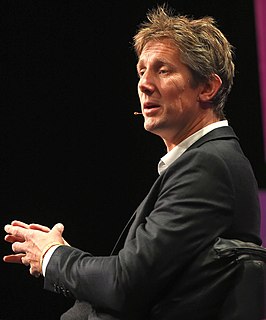A Quote by John Galsworthy
He was afflicted by the thought that where Beauty was, nothing ever ran quite straight, which no doubt, was why so many people looked on it as immoral.
Related Quotes
Why did the people think [Vietnam war] was fundamentally wrong and immoral? The guys who ran the polls, John E. Rielly, a professor at the University of Chicago, a liberal professor, he said what that means is that people thought too many Americans had being killed. Another possibility is they didn't like the fact that we were carrying out the worst crime since the Second World War. But that's so inconceivable that wasn't even offered as a possible reason.
Have you ever asked yourself why one person is honorable and another dishonorable; why one is honest, another dishonest; why one is moral, another immoral? Most individuals do not intend to be dishonest, dishonorable, or immoral. They seem to allow their characters to erode by a series of rationalizations, lies, and compromises. Then when grave temptation presents itself, they haven't the strength of character to do what they know to be right.
He stood staring into the wood for a minute, then said: "What is it about the English countryside — why is the beauty so much more than visual? Why does it touch one so?" He sounded faintly sad. Perhaps he finds beauty saddening — I do myself sometimes. Once when I was quite little I asked father why this was and he explained that it was due to our knowledge of beauty's evanescence, which reminds us that we ourselves shall die. Then he said I was probably too young to understand him; but I understood perfectly.
Naturally, grown-up citizens are concerned about the beatniks and delinquents. ... The question is why the grownups do not, more soberly, draw the same conclusions as the youth. Or, since no doubt many people are quite clear about the connection that the structure of society that has becoming increasingly dominant in our country is disastrous to the growth of excellence and manliness, why don't more people speak up and say so?
If a book were written all in numbers, it would be true. It would be just. Nothing said in words ever came out quite even. Things in words got twisted and ran together, instead of staying straight and fitting together. But underneath the words, at the center, like the center of the Square, it all came out even. Everything could change, yet nothing would be lost. If you saw the numbers you could see that, the balance, the pattern. You saw the foundations of the world. And they were solid.
There are many different kinds of doubt. When we doubt the future, we call it worry. When doubt other people we call is suspicion. When we doubt ourselves we call it inferiority. When we doubt God we call it unbelief. When we doubt what we hear on television we call it intelligence! When we doubt everything we call it cynicism or skepticism.
When I was in Dutch and Italian football, a lot of people looked at Manchester United, and when they were asked who was the best player, a lot of them said Paul Scholes. Much of what he did looked simple, but actually it was quite hard. Invariably he controlled the ball instantly and passed it straight on, keeping the game moving. He made inch-perfect passes across the pitch; he saw the gaps and could play the ball through them. So it didn't surprise me that so many top-class international footballers recognized his quality.




































